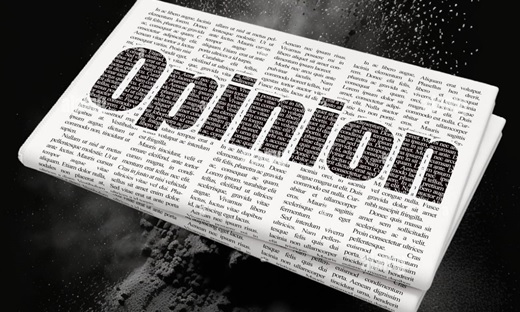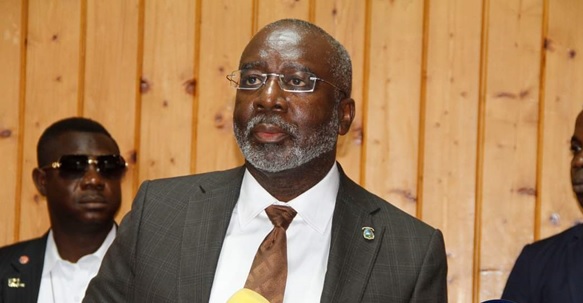By Socrates Smythe Saywon, Sr.
Liberia’s political scene is currently witnessing a momentous impasse in the House of Representatives, which, if unresolved, could have far-reaching consequences for the country’s democracy and governance. At the center of this standoff is the embattled Speaker of the House, Cllr. J. Fonati Koffa, whose refusal to resign has left the legislative body in a state of paralysis. Koffa justifies his decision to hold on to his position by invoking the rule of law, arguing that his colleagues from the Majority Bloc are violating legal procedures and principles in their attempts to oust him. This refusal has generated a contentious battle between the Speaker and members of his own bloc, leaving the House divided and raising serious questions about the functionality of Liberia’s democratic institutions.
Koffa, in his defense, claims that his position is firmly backed by legal protocols and constitutional mandates, stating that his colleagues’ actions to remove him without due process are unlawful. His invocation of the rule of law highlights a crucial aspect of Liberia’s constitutional order—where power is supposed to be checked and balanced by the law, and actions taken by public officials are subject to the principles of transparency, accountability, and due process. In theory, his insistence on adherence to the law should be seen as an example of constitutional integrity. However, in practice, this legal battle is prolonging a political crisis that undermines the very foundations of governance.
The Majority Bloc, on the other hand, sees Koffa’s leadership as a major impediment to the effective functioning of the House. They argue that his leadership style has been marked by poor decision-making, a lack of cohesion, conflicts of interest, and corruption allegations that have tarnished the image of the legislative body. For them, Koffa’s refusal to step down is less about the rule of law and more about personal interest and political survival. This standoff, they claim, has created an environment where the people’s business is not being properly attended to, and legislative activities are stalling as a result. The Majority Bloc’s call for his resignation, they say, is rooted in a desire to restore order and functionality to the House, ensuring that it can effectively represent the will of the people.
This deadlock represents more than just a struggle for political control; it is a test of Liberia’s democratic maturity and the country’s commitment to the rule of law. When leaders, whether from the executive or legislative branches, become more focused on maintaining their personal power than on the public good, the very essence of democracy is jeopardized. The inability of the House of Representatives to resolve this impasse has created a governance vacuum where partisan interests are prioritized over national interests, leaving the public increasingly disillusioned with their elected officials.
The ongoing crisis also raises important questions about the state of Liberia’s political culture. Is the rule of law being used as a shield to protect personal power, or is it being used as a tool to ensure that governance is carried out fairly, transparently, and in the best interests of the Liberian people? Speaker Koffa’s argument about legal procedure is compelling in its technicality, but it fails to address the extensive issues of accountability and leadership that the public expects from their representatives. His refusal to step down might be legally justified, but it is politically damaging. In a time of growing discontent with political elites, Koffa’s stance appears disconnected from the reality of a populace frustrated with corruption, inefficiency, and the perceived self-interest of their leaders.
For Liberia, a country emerging from years of civil conflict, the functioning of its legislative body is paramount to the health of its democracy. The failure of the House of Representatives to function properly means that the legislative process is delayed, oversight over executive actions is compromised, and laws necessary for national development may not be passed. In the absence of effective legislative leadership, the people of Liberia are left vulnerable to bad governance and unaccountable practices. The crisis within the House is not a mere internal dispute—it is a national issue with ramifications for the country’s democratic progress.
The wider implications of this impasse also lie in its impact on Liberia’s international image. Donor nations, international organizations, and foreign investors look to the functionality of a country’s political institutions as a key indicator of stability and predictability. A government embroiled in internal conflict, especially within its legislature, creates an environment of uncertainty. This, in turn, can hinder the country’s economic growth and damage its relations with key international partners.
As the Speaker continues to hold firm to his position, the question arises: What does this mean for Liberia? The country’s future depends on a resolution that respects the rule of law but also considers the broader picture of governance, accountability, and the people’s welfare. The political impasse within the House of Representatives is not just a battle between factions of elected officials—it is a test of Liberia’s democratic resilience. The outcome of this standoff will not only determine the fate of Speaker Koffa’s leadership but also shape the nation’s trajectory toward building strong, accountable institutions capable of serving the interests of the people.
Eventually, this impasse must be resolved through a balanced approach that upholds the rule of law while also prioritizing the national interest. It is imperative that Liberia’s political leaders, particularly in the legislature, recognize the gravity of the situation and act in a manner that restores confidence in democratic processes. If Speaker Koffa’s tenure is indeed lawful, he must recognize the political realities and work towards healing the divisions in the House. Similarly, those calling for his resignation must understand that the rule of law is non-negotiable, and any leadership change must occur within the confines of constitutional procedure. For Liberia to move forward, both sides must come to a resolution that strengthens rather than weakens the country’s democracy.
In conclusion, the current impasse in the House of Representatives is more than a political crisis—it is a critical moment for Liberia’s democracy. It calls for a sober reflection on the rule of law, the responsibilities of public office, and the imperative of putting national interests above personal or partisan considerations. The crisis in the House is a microcosm of the broader challenges facing Liberia, and how it is resolved will speak volumes about the future of governance in the country.







